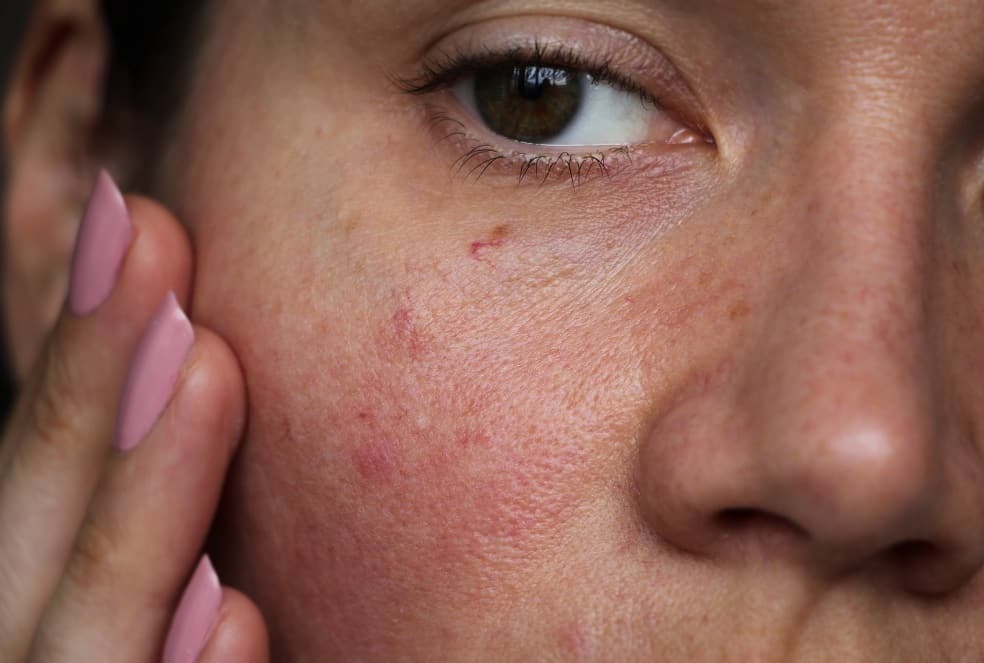Plagued by sensitive skin complications and unable to find the right skincare products? We got you covered.
Skin is unique for everyone. But to simplify skincare products and treatments, it is broadly classified into four types— normal, dry, oily, and combination. When you use the wrong skincare products or treatments on the skin, sensitive skin comes into the picture. Among all, sensitive skin is the trickiest to care for. You may either be born with sensitive skin but external conditions and lifestyle can also turn your skin sensitive. With the right treatment and skincare regime, combatting the usual issues posed by sensitive skin can be overcome. We’ve discovered seven skincare practices to care for and get healthy skin, let’s get to them.
What causes sensitive skin?
Before we delve into the tips, it is crucial to understand the underlying factors behind sensitive skin. Only then the right treatment and skin care products can be help to getting healthy skin. Here are a few causes behind skin sensitivity:
- Using over-abrasive cleansers or cleaning methods leads to micro-cuts and sensitivity
- Over-exfoliating using physical exfoliators as well as chemical exfoliators weaken the skin epidermis, eventually making it sensitive
- Medications for a drastic change in health conditions also make the skin sensitive
- Some are born with sensitive skin because of genetics
Tips to deal with sensitive skin

Irrespective of the reason behind sensitive skin, proper care and caution help to keep sensitive skin healthy and flawless.
Tip #1 Less is more
For sensitive skin, finding the right products is not always easy. Hence, it is advisable to stick to a short and effective routine using products that suit you best. Cleansing with a mild cleanser, a pH-balanced soothing and refreshing toner, and a hydrating moisturiser designed for sensitive skin issues is enough. If you’ve nailed the basic routine, you can include serums that target sensitive skin issues like inflammation, rashes, and occasional breakout depending on the skin condition at the moment.
Tip #2 Be careful with exfoliants
For sensitive skin types, it is advisable to keep exfoliating to a minimum. Once a week or once in two weeks with a gentle chemical exfoliant should be sufficient for sensitive skin. If your skin is extremely sensitive, skip exfoliation altogether.
Tip #3 Sunscreen is a must
Sensitive skin easily develops rashes, sunburn, and inflammation when exposed to sunlight for too long. Use a broad-spectrum sunscreen which has a high SPF and PA rating but is lightweight that will not clog pores. Additionally, patch tests the sunscreen first to see any reactions before you use it on your face. Apply sunscreen even when you are indoors and use accessories like scarves and umbrellas to cover yourself when you go out.
Tip #4 Avoid heavy makeup
Makeup may clog pores and lead to breakouts, especially for sensitive skin. It is best to avoid heavy-duty makeup under all circumstances. If you must use makeup, look for non-comedogenic formulas and make sure to remove every speck of it before sleeping.
Tip #5 Do not skip moisturisers

Moisturisers keep the skin hydrated and improve overall health and skin barrier protection of the skin. Skipping moisturisers can lead to additional complications like dryness, flaky skin, and so on. Use a quality moisturiser like Dr G HA Intense Moisturiser dedicatedly every day. It is lightweight, hydrating, safe, and dermatologically-tested, and is a concoction of soothing ingredients for sensitive skin.
Tip #6 Avoid allergic fragrance

Many products have artificial and allergic fragrances that are unnecessary and do not add to the quality of the product. This can aggravate sensitive skin and cause itchiness, rashes, and bumps. Hence, avoid any product that contains such perfumes, especially if you have a history of skin reactions to such ingredients.
Tip #7 Change products as your skin changes
Our skin changes subtly with climate, lifestyle, and age. What suited you for years may suddenly have no impact or even irritate the skin. When you suddenly get flare-ups, rashes, and bumps easily despite using your regular products, it's indicative that you need to upgrade the products. In such a situation, consult a dermatologist if required and change the products you are using.
Maintaining these few things can help you tackle sensitive skin throughout the year. You can flaunt your radiant and flawless skin despite the underlying problems when you figure out the best routine for it.


